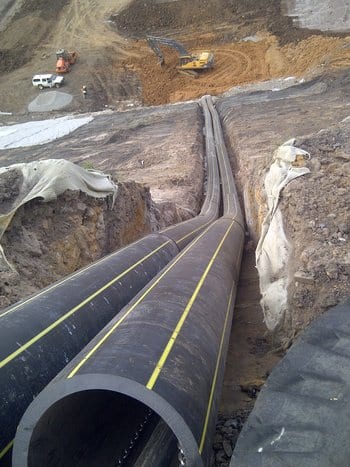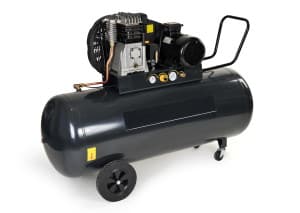Polyethylene (PE) vs Polypropylene (PP) – Pipe Differences
In the compressed air and pipe systems industry, there is a long list of options. From the equipment designed for industry use to the press fittings that connect everything together, engineers and system builders have the luxury of choice. This is due, in no small part, to the ability of manufacturers in the industry to innovate.
Here, we look at two easy-to-confuse piping types. Just one letter distinguishes PP and PE pipes, but they have several unique characteristics that specifiers must familiarise themselves with. Here, we explain why you should choose one over the other
PP (Polypropylene)

The physical attributes of PP are like PE (polyethylene). However, PP becomes more brittle at lower temperatures and it has poorer resistance to compressor oils than PE. Nonetheless, polypropylene has one of the highest chemical resistance ratings in the plastics category. Here at Air Energy, we suggest that PP should be used for hot and cold liquids, dairy products and laboratory and reverse osmosis systems.
PP can be used to replace existing pipe systems. Unlike steel piping, PP pipes are resistant to corrosion. At Air Energy, we provide two main kinds of PP piping: the standard neutral pipes and the fibre-reinforced green pipes. A complete selection of polypropylene pipe fittings is also available.
PE (Polyethylene)
MaXair® Compressed Air Pipe systems offer pipes rated at PE100. This means they offer 50 years of reliability when used at 30-degrees Celsius. Air Energy was the pioneer in distributing the highly successful maXair® piping systems. This brand currently exceeds most Australian standards in terms of safety and reliability.
Pipes are crucial for any compressed-air or liquid-movement systems. Choosing the right material is important for long-lasting infrastructure that gets the job done and minimises waste. Get in touch with Air Energy and open a gateway to the most reliable products available on the market today.
What is Poly Tubing?
Poly tubing is a highly flexible, lightweight, and durable tubing made from polyethylene, polypropylene, and polyurethane, which are polymers formed by the polymerisation of ethylene. It is a highly versatile tubing with break and crack-resistant walls. High-density polyethylene (HDPE) and low-density polyethylene (LDPE) are the two most common types of poly tubes (LDPE).
Advantages of Polyethylene
- Polyethylene has numerous valuable properties that make it suitable for various applications. It has low hardness but is very ductile and impact resistant; it will stretch rather than break. If it was to fail it would only fail in a ductile manner.
- Polyethylene is water-resistant and durable, so it outlasts other polymers when exposed to the elements.
- Polyethylene is an excellent electric insulator, providing resistance to electric current but can become electrostatically charged. This can be avoided by using antistatic agents.
- The transparency of polyethylene can range from nearly transparent to opaque. Low-density polyethylene (PE) is suitable for packaging due to its clarity.
Advantages of Polypropylene
- It is a reasonably priced material.
- Because of its semi-crystalline nature, it has high flexural strength.
- The coefficient of friction is low. It is chemically resistant to a wide range of bases and acids.
- It has a high fatigue resistance.
Which Should You Use?
There are many similarities between polyethylene and polypropylene. Still, they also have unique properties that can be maximised depending on how they are made and the applications they are used for.
Pipes
Polyethylene has a good resistance to compressor oils which are present in compressed air to a greater or lesser extent.
Polypropylene has a pronounced lower life expectancy in the presence of oils so for this reason polypropylene is to be avoided and polyethylene is the superior product.
 Power tools and other heavy equipment often dominate a workshop. While they are some of the most reliable components, there are other options available.
Power tools and other heavy equipment often dominate a workshop. While they are some of the most reliable components, there are other options available.
Air-powered tools provide a number of benefits for any workshop, and here are the reasons why.
Light And Energy Efficient
Air-powered tools use compressed air to operate, unlike conventional equipment that are powered by electricity and batteries. This makes the tool very energy efficient, sparing workshop owners from spending extra on batteries and other voltage supply.
As they don’t have huge power sources, they are considerably lighter than their electrical counterparts, making them more portable and easy to use. It also means that your workshop is free from electric cables, which can be both an annoyance and trip hazard.
Fewer Parts
Air tools are made up of fewer working parts, so there’s a lesser chance of mishaps. Those who are using the tool for the first time can quickly learn how to best operate the tool. With fewer working parts, it makes the tool easy to assemble and maintain, should anything go wrong.
They Can Be Stalled Indefinitely
Electric tools can burn out if stalled over a long period of time. In addition, the back Electro Magnetic Force drops to zero when this happens, overheating the motor. Air tools don’t have this problem, without electrical motors, they are spark-less, which makes them ideal for use in hazardous environments.
What Air Tools Should You Use
 Air compressors, hoses and filters are some of the most important equipment for a workshop to create an efficient air-powered system. Once you have these, you can incorporate other equipment including drills, sanders, wrenches, and many others.
Air compressors, hoses and filters are some of the most important equipment for a workshop to create an efficient air-powered system. Once you have these, you can incorporate other equipment including drills, sanders, wrenches, and many others.
If you are looking for the right equipment for your air-powered workshop, then Air Energy is your reliable supplier. We provide a comprehensive range of compressed air equipment, pumps and industrial pipework. You can be sure to find what you need from our collection.
Contact Air Energy to learn more about our products.